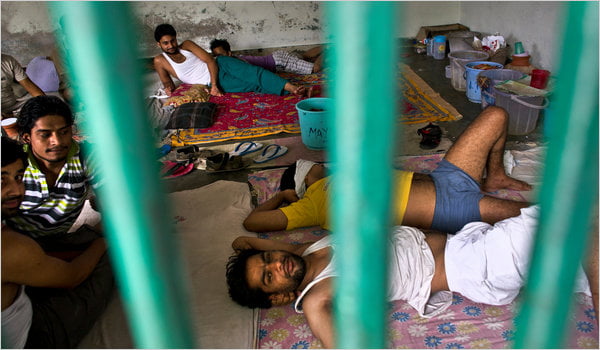Security and stability are marks of a civilized society. Which is why, all acts against the society are justly and suitably punished by the criminal system of such state. In fact for long, punishment of wrongdoers has been one of the primary functions of the State, from the age of feudalism to the colonial age to the modern-day. What has changed however is the purpose and practice of such punishment. What was once a wholly retributive token of justice, has now taken the form of a more corrective nature, which means that where once punishment was meant simply as deterrence by incapacitation, has now made way to prevent such incidence by reformative behavior. It is in the administration of such punishment that the prison system of a State comes into the picture.

The concept of social defence is well illustrated by the modern-day prison system of India which is entrusted with the custody, care and treatment of prisoners, which is different from its initial purpose to make imprisonment deterrent. However, the prison system in India is also one of the more maligned ones, with instances of brutality and abuse discoloring the gradual change to a more reformative attitude. The harsh reality remains that for every corrective step taken by a Central jail like Tihar, dozens of state and district jails burst into news for repulsive behavior. For every step taken in the right direction, prisons in India have firmly kept a foot in its archaic past. However, for all the talk about the much-maligned image of prisons in India, the sad fact is that the real casualty remains the prisoner.
A society cannot be recognized as a civilized one unless it treats its prisoners with sympathy and affection and more importantly, as humans endowed with the same human and fundamental rights as the rest. The same is recognized by the Constitution of India under Article 21 which ensures the right of every citizen to live a life of human dignity and also by the Universal Declaration of Human Rights which guarantees that no person shall be subject to inhuman, degrading or cruel treatment or punishment.And yet, with the exception of a few places, prisons have actively consorted to subvert the same rights.
Problems of inhumane treatment and torture, neglect of hygiene and overcrowding are problems that have long plagued the prison system of India. However, the biggest setback remains the persistent problem of judicial delays in India, a fact that amounts to over 35,000 cases in the S.C, 375,000 cases in the High Court and several million under the subordinate courts. The very degree of such backlog is made more obvious by the fact that over 65% of prison inmates are under-trials, or persons that have not yet been convicted under law, thereby leading to perpetual overcrowding of the limited jail premises.
It was in this regard thus, that the Code of Criminal Procedure Act, 2005 was passed which introduced Section 436A which essentially stated that an under-trial may be released if he/she has already served half the term for such offence, not being one prescribed with the death penalty, under detention. In other words, the law now stipulates that any person who has been under detention for more than half the term of an offence, who was charged with, can be so released.
However, although on the face of it the amendment sounds person-friendly, the statistics of the percentage of under-trials in jails remain consistent. The truth is that the petition for such a release under the aforementioned section remains just another cog in the wheel of the Indian judicial system. Without a provision for fast-tracking such cases, a petition for a release under Section 436A is just another file contributing to the huge backlog of court cases.

Another key problem with the prison system is the fact that many jail authorities, especially the ones in the districts across the country forego the provision of Legal Services Authorities, which is why most prisoners, under-trials and otherwise remain oblivious to their rights under the Constitution. Legal awareness for all its constitutional purpose has not been fully implemented at the grassroots level, and is only made worse by the abysmal number of State welfare and Legal Services officers present. The huge number of vacancies in the administrative and supervisory capacities of prisons in India also contributes to the widespread vagrancy, vices and inhumanity of Indian prisons today.
However, like any other issue in a democracy, the idea of reformation or correction of prisoners itself comes under attack often, with critics alleging that prisons by trying to initiate such reformative behavior, is instead cancelling out the deterrent that jails are supposed to be. Instead, the guarantee of a meal three times a day, and a shelter to sleep in is enough of a vice for anyone who is not blessed with the same, thereby encouraging him to participate in a crime that guarantees it. And perhaps, there is some truth in that observation but, as author Primila Lewis writes, ‘What is a man then, who chooses a life of captivity over that of freedom?’
All streams of media whether print or digital have long held a very partisan view of the prison system in India, often portraying jails as a cruel and xenophobic haven of villains. And this viewpoint stands, despite the several praise-worthy initiatives taken by Jail authorities like vocational training, literacy drives, computer classes, sports training and regular medical check-ups of prisoners. However, the fact remains that such practices remain rooted only in jail complexes like Tihar and Yerwada. Unless such measures don’t touch the jails in the bad hinterlands of India, or the real ‘bharat,’ prison reforms in India will remain an artifice.
The great Russian writer Fyodor Dostoevsky once said that the degree of civilization in a society can be judged by entering its prisons. That is true, because for a society headed towards initiating a more corrective and reformative measure of punishment, it’ll will be a shame if we cannot fathom the tiniest bit of affection, or even sympathy for those behind bars. They’re humans after all, and likely to change just like the rest of us. It is time, to give them an opportunity to do so.
By- Jibin Mathew George































